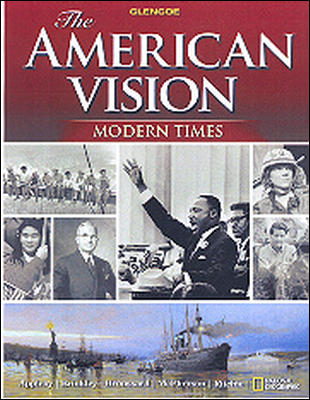
The American Vision: Modern Times © 2008Chapter 15: The Cold War BeginsChapter OverviewsThis chapter explains how a Cold War developed as relations between the United States and the Soviet Union deteriorated and the threat of communism seemed to penetrate every aspect of American life. Section 1 discusses how the alliances between the United States, the Soviet Union, and Britain unraveled in the years after World War II. The Soviet Union and the United States emerged from World War II with very different goals. Soviet leaders wanted to secure their borders and spread communism, while the United States wanted to promote free trade and democracy. At the Yalta Conference, the Big Three agreed that Europeans should choose their own governments and that Germany should be divided into four zones. However, Soviet-American relations deteriorated when Stalin demanded heavy German reparations for war damages. At the Potsdam Conference, it became apparent that the United States and the Soviet Union had very different visions of post-war Germany. The Soviets refused to make further commitments to upholding the Declaration of Liberated Europe, and Stalin never fulfilled his promise to allow free elections in Soviet-occupied countries. As the countries of Eastern Europe fell under the influence of communism, an iron curtain separated Eastern Europe from the West. Section 2 describes how the United States struggled to oppose Communist aggression in Europe and Asia at the start of the Cold War. Fearing Soviet expansion, President Truman initiated a policy to contain communism. The Truman Doctine pledged the United States to fight against communism, while the Marshall Plan used economic aid to help Western Europe's recovery. Truman's policies would be tested in Iran, Greece, and Turkey. A Soviet blockade of West Berlin convinced Americans that the Soviets were bent on conquest. The United States, Canada, and 10 European nations formed a mutual defense alliance—NATO. The Soviets countered with their own military alliance in Eastern Europe—the Warsaw Pact. Fears about the spread of communism heightened as China fell to Mao Zedong's Communist forces and a Soviet-Chinese alliance emerged. When Communist North Koreans invaded pro-Western South Korea, Truman decided to contain communism with a show of might. The Korean War led to increased U.S. military budgets and a permanent focus on Asia in the Cold War. Section 3 details the growing fear of communism that took hold during the Cold War. When China fell to communism and reports of Cold War espionage flooded the media, Americans began to fear that Communists were plotting to overthrow the United States government. President Truman's plan to screen all federal employees for loyalty fanned the flames of fear, while federal hearings attempted to expose Communists. The Red Scare spread as spy trials grabbed national attention, Congress passed anti-Communist legislation, and the search for spies widened. Wisconsin Senator Joseph McCarthy promoted national hysteria by turning his very public anti-Communist campaign into a witch hunt. News of the Soviet H-bomb heightened Americans' fears of nuclear attack and prompted many to designate bomb shelters, practice bomb drills, and prepare fallout shelters. It seemed Americans couldn't escape their fears as movies, television, and novels dramatized the fears of nuclear war and Communist infiltration. Section 4 follows President Eisenhower's efforts to reduce world tensions while containing communism. In the 1952 presidential election, Americans elected military hero Dwight D. Eisenhower to lead the nation in its Cold War struggle against communism. In order to fulfill his goals of promoting free enterprise and protecting the United States from subversion, Eisenhower gave the American defense policy a "New Look." His strategy of massive retaliation threatened the use of nuclear weapons if a Communist nation tried to seize a territory by force. Eisenhower used brinkmanship in negotiations over Korea, Taiwan, and the Suez Canal. When brinkmanship would not work, he sometimes used covert operations to prevent Communist uprisings in developing countries. A new Soviet leader accused the United States and other capitalist countries of starting an "arms race." As Eisenhower left office, there was no end in sight for the cold war. |  |















